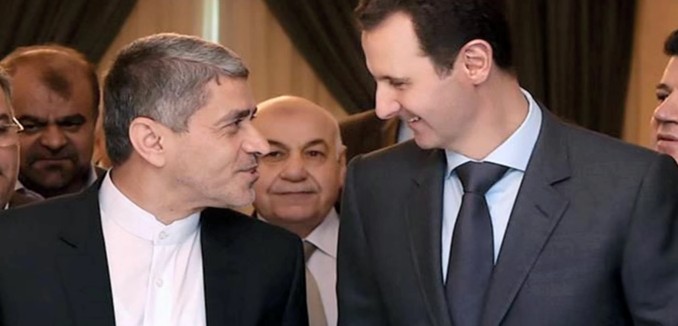The government of Syrian President Bashar al-Assad, despite a series of setbacks and defeats on the battlefield, has “moved aggressively to prevent regime collapse” with backing from foreign troops and Iranian financial support, according to an analysis written by Phillip Smyth yesterday in Foreign Policy.
Smyth noted that many Iraqi Shiite fighters left Syria to fight in Iraq in early 2014, but the slack was picked up by the Lebanese terror group Hezbollah and its sponsor, Iran.
Hezbollah’s military deployments within Syria have expanded along with its increased numbers. Not only is the group maintaining its advisory role with pro-Assad militia groups, but it has a significant combat presence in vital strategic areas. It played a leading role in an offensive in southern Syria, near the city of Daraa and in areas near the Golan Heights, and has reportedly taken casualties in the coastal area of Latakia. The most active front for Hezbollah, however, is the mountainous and strategically vital Qalamoun region, which links the northern coastal highlands to Damascus and directly abuts the organization’s Lebanese Bekaa Valley heartland. Following the melting of the winter snows, Hezbollah launched a major offensive in the area. These military advances have not been cost-free for the group: Since May 1, it has announced the deaths of 35 of its fighters.
Tehran also turned to entire new communities of foreign fighters to bolster the Assad regime. Starting in 2013, reports emerged of the funerals of tens of Afghan Shiite fighters in Iran, most originating from the Afghan Hazara refugee population in Iran. Some reports stated that the Iranian commanders viewed the Afghan Shiite troops as mere cannon fodder, reportedly sending criminals and paying them paltry sums. Regardless, since 2014 they have been active across Syria — in the Qalamoun region, Damascus, Latakia, Daraa in the south, and the restive city of Aleppo.
Smyth noted that Iran’s recruiting in Afghanistan and Pakistan is reflective of its intent to “[boost] its influence deep into communities in Central Asia.”
Assad’s forces have benefited not only from the influx of foreign fighters, but also from a system of incentives and punishments for the local population to ensure that Syrians support the regime. Late last year, for example, Assad cracked down on draft dodgers. However those who fight for Assad, or their survivors, are rewarded.
In December 2014, Syria issued a law stating that half of open public-sector jobs should go to the families of fallen fighters and those who have been injured while fighting to protect Assad’s rule. In April 2015, the Assad government even distributed so-called “Honor Cards” for family members of those killed fighting for Assad; the cards give their holders access to free medical care and half-off public transportation. The regime has also reportedly doled out compensation for villages in Latakia attacked by rebel and jihadi forces. Another carrot for pro-Assad government workers has been the addition of a 4,000 Syrian pound (around $20) monthly bonus for state employees and retirees. These initiatives may seem meager, but in a country ravaged by near-endless conflict since 2011, a secure job and regular payments can do much to preserve loyalty.
The generous benefits doled out by the Assad regime are paid for by Iran, which is spending as much as $35 billion on Syria annually.
While the losses have been taking a toll on the Syrian government, “Tehran and Damascus are doing their best to stave off collapse and strike back at their foes,” Smyth wrote. Among the notable recent setbacks and challenges faced by the Assad regime have been the battle of Qalamoun on the border with Lebanon against jihadist rebels, the loss of Palmyra to the Islamic State of Iraq and Syria (ISIS), and the arrest of two top officials for allegedly planning a coup.
Smyth’s analysis matches that of Jonathan Spyer, director of the Rubin Center, who wrote last month in The Jerusalem Post that Iran is committed to propping up its clients in Damascus, so “it would be premature to pronounce the regime’s imminent demise.”
[Photo: wochit News / YouTube ]




